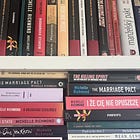A Self-Publishing Success Story: Blake Crouch
The Unforgettable Worlds of Blake Crouch: What Writers Can Learn from DARK MATTER and RUN

I was excited to get my hands on an advance copy RUN, by Blake Crouch. After devouring it, I realized that RUN isn’t exactly new. It was originally self-published in 2011. Following on the massive success of some of Crouch’s other books, not to mention the Wayward Pines TV series based upon the Wayward Pines trilogy and the Dark Matter series, Penguin Random House is releasing RUN in October.
Another of Crouch’s self-published books, Famous, has just been picked up by Pan MacMillan. One interesting thing I learned in this Blake Crouch interview from 2011 is that he published four books traditionally with St. Martin’s before he began self-publishing. He first started self-publishing as a way to “spur my ‘real’ book sales.” Eventually, he got his rights back from St. Martin’s and started his path to becoming the massively bestselling author he is now.
One might look at Crouch’s story and think, “Wow, I should be self-publishing!” But before you decide to self-publish, read a couple of Crouch’s books. They’re fast-paced and thrilling, and the writing is strong. In other words, they didn’t rise to the top just because Crouch has marketing savvy; they captivated readers because they’re really good books. I think Recursion was the first self-published novel I ever purchased. I did so on the basis of a Kindle sample.
Crouch’s forthcoming novel, RUN
I can't remember the last time I devoured a novel in two sittings. RUN is a riveting thriller in which emotions run deep and the characters are complex and fully realized: a mother and father, long at odds in their marriage, must save their two children from unspeakable horrors.
In the wake of a solar flare, millions of upstanding citizens of the lower 48 have become vicious, capable of the most brutal crimes imaginable against their friends, their neighbors, even their own families. Some of the scenes feel like a blueprint for the 2024 film CIVIL WAR, which I loved, and which came out more than a decade after RUN's initial publication. The film is about journalists, while the book is about a family, but RUN and CIVIL WAR share an apocalyptic landscape of extreme civil unrest, neighbor turning against neighbor.
In RUN, as the body count rises and the entire country goes to hell, the family keeps driving, climbing, crawling--starving, thirsty, and traumatized--in an attempt to reach the safety of the border. The stakes are clear from the word go, the challenges seemingly insurmountable. After finishing the book, I kept thinking about it, the images so horrifying they took root in my brain. But I think this is part of the reason for Crouch’s tremendous success in many arenas: self-publishing, traditional publishing, and adaptations. Crouch makes us care about these characters first, and then he puts them through such punishing, seemingly insurmountable ordeals, it’s impossible to look away, even when we want to.
The novel begins with a declaration of love for the protagonist’s family. We see him in an intimate moment with his wife Daniela and his son Charlie. Instantly, we are set up to care about the protagonist, Jason. By the end of page one, we know that Jason is about to lose “everything I know, everything I love.”
Dark Matter
If you haven’t yet watched DARK MATTER, the Apple TV series based on the Blake Crouch novel by the same name, I envy you. Again, it’s a high-concept thriller that makes your heart race, but before concept, it’s about the characters.
Substack Shout-out:
of Pretend It’s a Newsletter is also a Crouch fan, calling Dark Matter “another book I couldn’t help but rip through in a day. Starts out very normal and dissolves into madness (an arc I LOVE).” You can read more of Chelsea’s book recommendations here.Another Substack Shout-out: So is
of Read More Books, who includes Crouch’s Upgrade in a list of bleak books that nonetheless “offer enough glimpses of hope and optimism to keep you from mentally spiraling down a path of complete gloom and doom.” If you want to expand your summer reading list, check out Andenberg’s post The Future Is Bleak…or Is It?The takeaway:
Whether you want to self-publish or go the traditional route, you can learn a lot from Crouch’s books about hooking readers in the opening pages and keeping them enthralled. When you look at your own novel-in-progress, ask yourself:
Have I made the reader care about my protagonist?
What are the stakes, and why will readers care?
Do you want to write a novel, but you’re not sure how to begin? You might enjoy Foundations of Novel Writing, my eight-week on demand course that will help you get your novel off to a strong start. Save $75 when you enroll through this link.





The two takeaways at the end of this post are such great advice. Ultimately the reader either cares about your protagonist or they won't from the very first chapter and it's always a toss-up. But if the writer just thinks it over, often they will be moving more towards better odds that the reader will care (even a little). There are different ways to figure it out. Some writers think about it, get the right answer and they're off to the races. Seat of the pants writers might ask the question in their heads and nothing pops up. Later on the way to the post office sacre bleu, something pops up. But what is it? Your brain is trying to help you. Look it over. It may be a tiny detail. It may be a fragment of an opening scene or some sort of something. The way it captured you on the way to the post office might be how it captures the reader in the first two paragraphs of your book. So thank you. I think these two takeaways are golden.